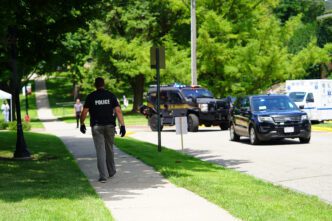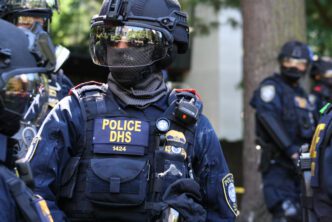Executive Summary
- The U.S. Marshals Service Director reports a significant decrease in violent crime in Washington, D.C., following a 100-day federal operation initiated by President Donald Trump.
- Statistics cited include a 60% drop in murders, a 50% reduction in robberies, and a 70% decrease in carjackings compared to the same period last year.
- The operation involved 31 federal and local agencies, resulting in 6,127 arrests and the seizure of 600 illegal firearms.
- The director is calling for local legislative reforms, including an end to cashless bail and changes to juvenile justice and police pursuit policies.
WASHINGTON – The director of the U.S. Marshals Service announced that a 100-day federal crime crackdown initiated by President Donald Trump has led to a significant decrease in violent crime across Washington, D.C. The operation, which deployed the National Guard and U.S. Marshals, is being credited with thousands of arrests and a substantial reduction in murders, robberies, and carjackings.
U.S. Marshals Director Gadyaces Serralta reported that the multi-agency effort has yielded considerable results. “Murders are down 60% to the same time last year, robberies are down 50% carjackings are down a whopping 70%,” Serralta stated. He credited the success to President Trump for assembling 31 different agencies, with the U.S. Marshals Service as the lead, and to policies that “unhandcuffing the law enforcement officers and let them do their work.” The operation has resulted in 6,127 arrests and the seizure of 600 illegal firearms.
Despite the operational success, Serralta called for significant changes to local laws to ensure the progress is sustained. He specifically criticized Washington, D.C.’s cashless bail system, arguing that it allows arrested individuals to be released too quickly. “They’re still walking free until we pass these policies,” he said, emphasizing the need for reform.
The director also expressed concern over the juvenile justice system and police pursuit policies. He noted that juveniles are heavily involved in serious crimes, including carjackings and homicides, but are often treated with “kid gloves.” Serralta advocated for changes to police chase policies, which he believes currently prevent officers from effectively pursuing juvenile suspects.
Serralta acknowledged that a severe officer shortage at the Metropolitan Police Department, which the D.C. Police Union reports is down by 820 officers, also impacts crime. He pointed to the federal CRIMES Act, passed by the House of Representatives, as a potential solution. The legislation aims to lower the age at which criminal defendants are eligible for reduced sentences and can be tried as adults for certain violent offenses. It is important to note that individuals arrested are presumed innocent until proven guilty in a court of law.






